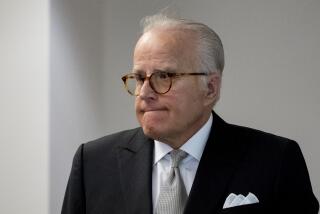Admits Arms Scandal Has Hurt Him Politically : Bush Says He Shares Blame for Mistakes
- Share via
WASHINGTON — Vice President George Bush, acknowledging he has been politically wounded by the Iran- contras arms scandal, says he shares the blame for what went wrong--and that he and President Reagan should have been better informed about what their subordinates in the National Security Council were doing.
“I wish it hadn’t happened,” Bush said in an interview with five reporters as he returned Friday night from a campaign foray to Iowa. “I think everybody, to the degree there were mistakes, I think everybody should share in the blame.”
Bush added that Reagan has accepted responsibility for the affair, and: “I think that’s the proper way to talk about it--you can’t go running for cover. You can’t take the good and, you know, filter out the bad.”
Declines to Talk of Advice
The vice president repeatedly refused to talk about what advice he gave Reagan in formulating the Iran arms policy, except to say he is “convinced” that the United States was not trading weapons for hostages.
Bush agreed, however, that the American public has a “perception” that “the President was willing to trade hostages for arms. And that’s not what he did.” Others in the Administration have said that the twin goals of opening a relationship with moderate factions in Iran and freeing Americans held in Lebanon became intertwined so that Reagan ultimately was engaged in trading weapons for hostages.
Bush conceded that the controversy has become an early setback to his quest for the presidency, but he offered a sanguine view of the situation, saying his political fortunes and those of the President would bounce back once the full story is known. “The truth is going to bring him back,” he said of Reagan.
Denies Knowing of Aid
In his second address on the Iran affair Friday in Iowa, Bush reiterated the point that “mistakes were made” by the Administration. Bush insisted that he and Reagan did not know about the diversion of money from the Iran arms sales to the Nicaraguan rebels. He called on former National Security Adviser John M. Poindexter and his assistant, Lt. Col. Oliver L. North, to break their silence on the affair, predicting they would exonerate the President and vice president of knowledge of the diversion.
Bush was asked whether he agreed with First Lady Nancy Reagan that the President was deceived by aides and whether he and the President should have been better informed about the activities of North and Poindexter.
“I think when you see two people leave because they didn’t inform the President, that speaks for itself,” he said. Questioned whether he and Reagan should have known about the diversion of money to the contras, Bush said: “I think something that important, the answer is yes. There’s a lot of details that I would answer definitively, no, but something like that, sure.”
Bush, a former director of the CIA, diplomat and congressman who has often been described as a leading player in Administration foreign policy decisions, was asked whether he felt a sense of personal failure in the wake of the disclosures that money was diverted, possibly illegally, to the contras.
‘I Now Have Suggestions’
“The system isn’t designed for any individual to make a decision,” he said. “But as a participant, clearly I now have suggestions about how to improve things. Therefore, you’ve got to assume I think certain things haven’t worked perfectly. Therefore, I would be perfectly glad to accept whatever my share of responsibility is.”
While saying not all the facts are known, Bush added that the diversion of money through a secret Swiss bank account was a mistake.
Bush peppered his remarks with pledges of loyalty to Reagan, saying he would not “cut and run,” which he implied Sen. Bob Dole (R-Kan.) has done in his criticism of the Iran policy. “Loyalty is not a character flaw,” Bush said.
More to Read
Get the L.A. Times Politics newsletter
Deeply reported insights into legislation, politics and policy from Sacramento, Washington and beyond. In your inbox twice per week.
You may occasionally receive promotional content from the Los Angeles Times.










